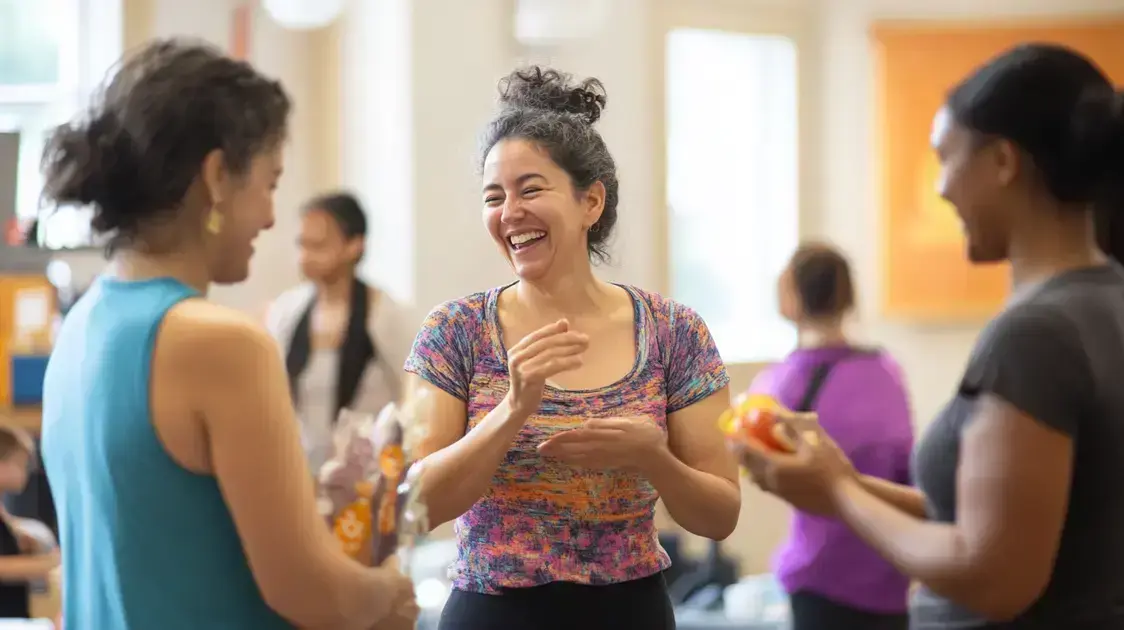Princeton Fitness Wellness: Unlock Your Full Potential for Health and Happiness
Princeton Fitness Wellness is all about more than just working out. It emphasizes a holistic approach to health, focusing on physical, mental, and emotional well-being. The goal is to create a balanced lifestyle that nurtures both the body and the mind.
Physical activity plays a central role, but it’s not just about hitting the gym. Activities like outdoor walks, cycling, and other exercises encourage a strong connection with nature while strengthening the body.
Interested in living a healthier, more active life in Princeton? Stay tuned for more tips and ideas on how the city supports a wellness-focused lifestyle.
Understanding Princeton Fitness and Wellness
Understanding Princeton fitness and wellness is crucial for anyone looking to improve their health and happiness. It encompasses a wide range of activities and lifestyle choices that contribute to overall well-being.
In Princeton, this concept blends physical fitness, mental health, and community engagement, making it a comprehensive approach to living well.
Components of Fitness
Fitness is not just about working out in a gym. It includes various aspects such as strength training, cardiovascular health, flexibility, and balance. In Princeton, many programs encourage residents to participate in outdoor exercises like hiking and biking, promoting both fitness and appreciation for nature.
The Importance of Wellness
Wellness goes beyond physical health; it includes emotional and mental well-being. In Princeton, wellness programs offer stress management techniques, counseling, and mindfulness activities aimed at improving mental health.
Integrating these practices into daily life can lead to better emotional resilience and overall happiness.
Community Engagement in Princeton
One unique aspect of fitness and wellness in Princeton is the strong sense of community. Local organizations often host fitness events and wellness festivals, allowing residents to participate in group activities.
This social engagement not only fosters friendships but also enhances motivation to live a healthier lifestyle.
Understanding these elements can empower individuals to make informed choices that positively impact their health and happiness. By embracing both fitness and wellness, residents of Princeton can experience a more vibrant and fulfilling life.
The Importance of Fitness in Daily Life
The importance of fitness in daily life cannot be overstated. Integrating regular physical activity into your routine has numerous benefits that impact both body and mind. In Princeton, maintaining fitness is seen as essential for a balanced lifestyle.
Physical Health Benefits
Staying fit helps maintain a healthy weight and reduces the risk of chronic diseases, such as heart disease and diabetes. Engaging in activities like running, cycling, or swimming strengthens the heart and lungs while improving stamina.
Mental Well-Being
Regular exercise is linked to improved mood and reduced anxiety. When you exercise, your body releases endorphins, which are natural mood lifters. Incorporating fitness into your daily routine can lead to better mental clarity and emotional resilience.
Building Social Connections
Participating in group fitness activities fosters social connections. Whether it’s a yoga class, a running club, or fitness boot camps in Princeton, these activities not only keep you active but also build friendships and a supportive community.
Enhancing Daily Functionality
Being fit improves your body’s ability to perform daily tasks, from climbing stairs to lifting heavy objects. A fit body gives you more energy, making it easier to power through workdays and household chores with ease.
Incorporating fitness into your life is essential for both physical health and emotional well-being. Prioritizing fitness will lead to a happier, healthier existence.
Exploring Wellness Programs in Princeton

Exploring wellness programs in Princeton reveals a variety of resources designed to support community members in their journey towards better health. These programs offer opportunities for physical, emotional, and social well-being.
Local Wellness Offerings
Many local facilities, such as community centers and gyms, provide structured wellness programs. These include fitness classes, nutrition workshops, and wellness seminars that educate participants about healthy living.
Holistic Approaches
Some wellness programs in Princeton focus on holistic health, which combines physical activity with mental and emotional well-being. Practices like yoga, tai chi, and meditation can be found in local studios, promoting overall balance.
Corporate Wellness Initiatives
Employers in Princeton are increasingly recognizing the importance of wellness programs. Many corporations offer wellness initiatives that encourage employees to engage in healthy behaviors, such as fitness challenges, health screenings, and stress management workshops.
Community-Based Events
Events such as wellness fairs and health expos provide opportunities for residents to explore various health topics. These events often include free classes, activities, and informational booths that promote local wellness resources.
Partnerships with Local Experts
Many wellness programs collaborate with local health professionals, including dietitians, personal trainers, and mental health experts. This ensures that community members receive reliable information and support in their health journeys.
By participating in these wellness programs, residents can take active steps towards improving their overall health and happiness. The variety of options available makes it easier for individuals to find the right fit for their lifestyle.
Tips for a Sustainable Fitness Regimen
Implementing a sustainable fitness regimen is key to achieving lasting health and well-being. Here are some tips that can help you maintain your fitness journey over the long term.
Set Realistic Goals
Start with achievable fitness goals. Instead of aiming for drastic weight loss or extreme workout regimens, set small milestones. This can keep you motivated and prevent frustration.
Create a Routine
Establish a regular workout schedule that fits into your lifestyle. Consistency is vital, so find times that work best for you, whether it’s early in the morning or right after work.
Mix It Up
To prevent boredom, include a variety of activities in your regimen. Combine strength training, cardio, and flexibility exercises to keep your workouts interesting and cover all aspects of fitness.
Listen to Your Body
Pay attention to how your body feels. If you’re tired or in pain, allow yourself a rest day. Remember, recovery is just as important as the workouts themselves.
Stay Hydrated and Eat Well
Nutrition plays a significant role in fitness. Drink plenty of water and eat a balanced diet rich in fruits, vegetables, lean proteins, and whole grains. Fuel your body properly to support your workouts.
Find a Workout Buddy
Having a friend join you can make exercising more enjoyable. You can motivate each other and hold each other accountable. Plus, it adds a social element to your fitness routine.
Track Your Progress
Keeping a journal or using an app to track your workouts can help you see how far you’ve come. Celebrate your achievements, no matter how small, to stay motivated.
Stay Flexible
Life can be unpredictable. If you miss a workout or skip a day, don’t be hard on yourself. Adapt your plan as needed and get back on track as soon as possible.
Using these tips can help you develop a sustainable fitness regimen that lasts and supports your overall health and happiness.
Nutrition and Its Role in Fitness
Nutrition plays a vital role in fitness and is essential for achieving optimal health. The food we eat significantly impacts our energy levels, recovery, and overall performance. Here are some key aspects of how nutrition supports fitness.
Fueling Your Workouts
To perform well during workouts, your body needs the right fuel. Consuming a balanced diet filled with carbohydrates, proteins, and healthy fats helps provide the energy necessary for exercise. Carbohydrates are especially important as they serve as the primary energy source.
Post-Workout Recovery
After exercising, your body needs nutrients to recover. Eating a mix of protein and carbs within 30 minutes post-workout can help repair muscles and replenish energy stores. Foods like yogurt and fruit or a protein shake work well for recovery.
Maintaining a Healthy Weight
A well-balanced diet is crucial for weight management. Eating nutrient-dense foods ensures you get vitamins and minerals without excess calories. This balance supports your fitness goals, whether it’s losing weight, gaining muscle, or maintaining overall health.
Hydration Matters
Staying hydrated is just as important as nutrition. Water is essential for numerous bodily functions, including temperature regulation and nutrient transportation. Aim to drink enough water before, during, and after exercise to stay hydrated and perform your best.
Smart Snacking
Incorporate healthy snacks throughout the day to maintain energy levels. Options like nuts, fruits, and yogurt provide essential nutrients without excessive sugars or unhealthy fats. This can help you stay focused and energized for your workouts.
The Importance of Variety
Eating a variety of foods ensures you get a range of nutrients. Different colors and types of food provide different vitamins and minerals. Explore fruits, vegetables, whole grains, and proteins to keep your diet balanced and enjoyable.
By understanding the role of nutrition in fitness, you can make better food choices that enhance your performance and support your health goals.
Mindfulness and Mental Wellness Techniques

Mindfulness and mental wellness techniques are essential for maintaining a balanced lifestyle. Incorporating these practices can significantly enhance your overall health, especially alongside fitness. Here are several techniques to consider:
Practice Deep Breathing
Deep breathing exercises help center your thoughts and reduce stress. Try taking a few moments to inhale deeply through your nose, hold for a few seconds, and exhale through your mouth. Repeat this several times to calm your mind.
Engage in Meditation
Meditation allows you to focus on the present moment. Find a quiet place, sit comfortably, and concentrate on your breath. Start with just a few minutes each day and gradually increase the time as you become more comfortable.
Gratitude Journaling
Writing about what you’re thankful for can improve your mental outlook. Each day, jot down three things that make you feel grateful. This simple habit helps shift your focus from negativity to positivity.
Mindful Eating
Pay attention to what you eat by engaging all your senses. Notice the flavors, textures, and aromas of your food. This practice can help you appreciate your meals and prevent overeating.
Regular Physical Activity
Incorporating exercise into your routine is a powerful form of mindfulness. Whether it’s yoga, walking, or dancing, focusing on movement helps clear your mind and boost your mood.
Limit Distractions
Set aside specific times to unplug from technology and other distractions. Use this time to connect with yourself, be in nature, or engage in hobbies that bring you joy.
Connect with Others
Building supportive relationships can enhance your mental well-being. Reach out to friends and family, or consider joining community groups where you can share experiences and support one another.
Using these mindfulness and mental wellness techniques can lead to improved focus, reduced anxiety, and overall better health. By combining these practices with your fitness journey, you can achieve a more holistic approach to well-being.
Community Support in Fitness Initiatives
Community support in fitness initiatives plays a critical role in promoting health and wellness. When individuals come together, they can create a positive environment that encourages everyone to pursue their fitness goals. Here are several ways community support can enhance fitness initiatives.
Group Workouts
Participating in group workouts fosters a sense of belonging and motivation. Classes like aerobics, cycling, and yoga allow community members to engage in fitness together, making it more enjoyable and less intimidating.
Accountability Partners
Having an accountability partner significantly boosts commitment. When friends or family join you in your fitness journey, they can encourage and support you through challenges, making it easier to stick to your regimen.
Local Fitness Events
Community organizations often host fitness events, such as fun runs, cycling races, and health fairs. These events not only promote active living but also bring people together, building connections and a shared focus on health.
Support Groups
Fitness-focused support groups can provide valuable resources and encouragement. Whether it’s a weight-loss group or a running club, these groups offer a platform to share experiences, tips, and success stories.
Access to Resources
Community support can also enhance access to resources like free fitness classes, workshops, and nutrition counseling. Local health initiatives often aim to provide tools and knowledge that empower individuals to make healthier choices.
Promoting Mental Well-Being
Engaging in community fitness initiatives positively impacts mental health. Being part of a group and sharing experiences can alleviate feelings of loneliness and stress, creating a stronger, healthier community.
By fostering a supportive environment, we create opportunities for individuals to thrive in their fitness journeys. Community involvement is essential in making fitness inclusive and accessible to all.
Success Stories from Princeton Fitness Enthusiasts
Success stories from Princeton fitness enthusiasts inspire others to embark on their own fitness journeys. Here are a few examples of individuals who transformed their lives through dedication and community support.
Maria’s Weight Loss Journey
Maria began her fitness journey at 250 pounds, feeling exhausted and unhealthy. By joining a local gym in Princeton and participating in group classes, she found the motivation she needed. Through consistent workouts and a balanced diet, Maria lost 70 pounds over the course of a year. She now feels more energetic and enjoys a healthier lifestyle.
John’s Challenge to Run a Marathon
After watching a marathon in Princeton, John decided he wanted to push his limits. With limited running experience, he joined a local running club for support.
The encouragement from fellow runners and structured training plans helped him complete his first marathon within six months. John now shares his story to inspire others to chase their fitness goals.
Karen’s Mindfulness Transformation
Karen struggled with anxiety and sought refuge in yoga. She found a community yoga studio in Princeton where she learned mindfulness techniques.
Over time, her mental clarity and emotional resilience improved significantly. Today, Karen leads group meditation sessions, showing others how mindfulness can change their lives.
Michael’s Commitment to Strength Training
Michael was a sedentary office worker until he realized his health was at risk. He started lifting weights at a Princeton gym and quickly became passionate about strength training.
With guidance from trainers and community support, Michael has transformed his physique and now participates in local fitness competitions.
Emma’s Nutrition Journey
Emma was always confused about nutrition. After attending a nutrition workshop in Princeton, she learned the importance of balanced meals. With proper knowledge, Emma revamped her diet, incorporating more whole foods. Now, she feels healthier and has more energy to keep up with her active lifestyle.
These success stories show that with determination, support, and the right resources, anyone can achieve their fitness goals. They serve as reminders that the journey towards health and wellness is a shared experience.
Future Trends in Fitness and Wellness

Future trends in fitness and wellness are continuously evolving as new technologies emerge and health priorities shift. Here are some key trends shaping the future of fitness and wellness:
Personalized Fitness Programs
With advancements in technology, personalized fitness programs tailored to individual needs are becoming more common. Fitness apps and wearable devices will track progress, analyze data, and create customized workout plans, making fitness more accessible and effective.
Virtual and Augmented Reality Workouts
Virtual reality (VR) and augmented reality (AR) workouts are gaining popularity. These immersive experiences allow users to engage in fitness activities from the comfort of their homes while enjoying interactive environments. Gamifying workouts can lead to increased motivation and enjoyment.
Holistic Health Approaches
Future trends will focus on holistic health, emphasizing the interconnectedness of physical, mental, and emotional well-being. Programs that integrate mindfulness, nutrition, and fitness will become more prevalent, helping individuals achieve overall health.
Wearable Fitness Tech
Wearable technology such as smartwatches and fitness trackers will continue to advance. These devices will monitor biometrics like heart rate, sleep patterns, and activity levels, providing users with real-time feedback to improve their health.
Emphasis on Mental Wellness
As awareness of mental health grows, wellness programs will incorporate practices that support mental wellness, such as stress management techniques, meditation, and community support. This is crucial for improving overall quality of life.
Community-Driven Fitness
Community support remains a vital aspect of fitness and wellness. Future initiatives will encourage group activities, social interactions, and local challenges that foster engagement and accountability, driving more individuals to pursue fitness goals together.
These trends reflect a more integrated approach to fitness and wellness, focusing on personalization, technology, and community support. Keeping an eye on these developments will help individuals adapt their fitness journeys to meet future demands.
FAQ – Frequently Asked Questions about Princeton Fitness Wellness
What is the importance of fitness in daily life?
Fitness is essential for maintaining physical health, improving mood, and enhancing overall quality of life. Regular exercise helps prevent chronic diseases and boosts energy levels.
How can community support improve fitness initiatives?
Community support fosters motivation and accountability. Engaging in group workouts and local events can create a sense of belonging and encourage individuals to pursue their fitness goals.
What role does nutrition play in fitness?
Nutrition is crucial for fueling workouts and aiding recovery. A balanced diet provides the necessary nutrients and energy for effective exercise and overall health.
What are some mindfulness techniques for mental wellness?
Techniques such as deep breathing, meditation, and gratitude journaling can help reduce stress and promote mental clarity, enhancing overall well-being.
What are the future trends in fitness and wellness?
Future trends include personalized fitness programs using technology, virtual reality workouts, a focus on mental health, and community-driven fitness initiatives that emphasize holistic health.
How can I create a sustainable fitness regimen?
Setting realistic goals, establishing a routine, incorporating variety, and listening to your body are key components in creating a sustainable fitness regimen that you can maintain over time.
